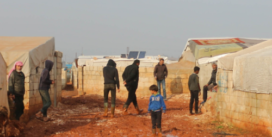- Fall Newsletter, 2025, Issue 15
- Using International Online Learning Modules to Engage Students in the Study of Critical Global Issues
- Upcoming Book Launch: Hearts of Freedom
- Announcing winners of the 2025 CARFMS Essay Contest
- The New York Declaration for Refugees and Migrants and its two Global Compacts: Addressing the Symptoms or the “Root Causes” of Forced Displacement?*
Special Sessions
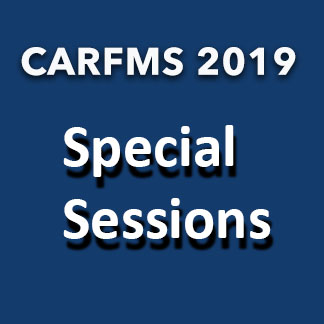
There will be two very early morning sessions with refugee students from Dadaab, Kenya and three film screenings during the conference.
BHER Panels at CARFMS 2019 (both held in ACW206)
Date: Wednesday May 15, 2019 at 7:30-9:00 am
1) Action Research in the Dadaab Refugee Camps, Kenya
Moderator: Don Dippo (moderator) with undergraduate students in Dadaab presenting their action research projects (connection via Zoom)
The Dadaab Refugee Camps is a place that has been extensively researched by scholars and practitioners from the global north. Refugees and refugee communities are seldom able to conduct and share their own research in academic spaces. Over the past year, the BHER Project offered an action research course where undergraduate students in Dadaab were able to go into their communities and conduct research on challenges in equity and education that they felt were relevant in the Dadaab Camps, ranging from the impacts of FGM, music education, schooling feeding programs, and out-of-school children.
Speakers in Dadaab: Abdi Bashir (Understanding the Instruction and the Teaching of Pre-Primary Life Skills Curriculum in Two Schools in Hagadera Zone, Dadaab, Kenya), Kassahun Hiticha (Marginalized Out of School Children – Primary), Abulong Okello (Choir Formal Education in a Primary School in Ifo Camp), Abdi Aden (Importance of School Feeding Programs in Dagahaley Primary Schools), Deka Shahow (The Impact of Poverty on Single Mother-headed Families Living in Dagahaley Camp), Dahabo Ibrahim (The Impact of FGM on Child Education at Dagahaley Camp)
Date: Thursday May 16, 2019 at 7:30-9:00 am
2) Refugee Scholars in Dadaab: Graduate Study and Research in Displacement
Moderator: Mohamed Duale (moderator) with current graduate students in Dadaab presenting in-depth proposals for their Major Research Papers (MRP) (connection via Zoom)
Over the last five years, the Borderless Higher Education for Refugees (BHER) Project has nurtured a cohort of emerging refugee scholars who are committed to the realization of equitable, peaceful and sustainable development in emergency and post-conflict settings in the Horn of Africa. This first cohort of Master of Education students will be presenting their in-depth proposals for their major research projects in the Dadaab Refugee Camps and the wider region. The panel will also focus on the challenges of pursuing graduate education in displacement, and the importance of refugees as knowledge producers in academia, a field where they are over-researched but their voices are vastly underrepresented.
Speakers in Dadaab: Abdikadir Abikar (The Impact of Introducing School based In-Service Training in Ifo Primary Schools to Academically and Professionally Support Untrained Teachers), Abdullahi Yusuf Aden & Arte Dagane (Why the Female Drop Out Rate is Higher than the Male Drop-out Rate in Secondary Schools in Ifo Refugee Camp, Dadaab), Fatuma Jama (Factors Influencing Girls Access to Primary Education in Dagahaley Camp, Dadaab, Kenya), Robert Ochan Leomoi (Exploring Examination Malpractices among Refugee Students in Secondary Schools in Ifo Camp, Dadaab, Kenya), Okello Mark Oyat (Investigating Corporal Punishment in Refugee Secondary Schools: The Case of a Secondary School in Ifo Camp, Dadaab), Ahmed Mukhtar Abdi (The Challenges and Impact of the New Somali Curriculum in Kismayu: The Case of Primary Schools)
Film Screenings
Tuesday May 14, 2019 at 5:00pm – 7:00pm
Room ACW 206
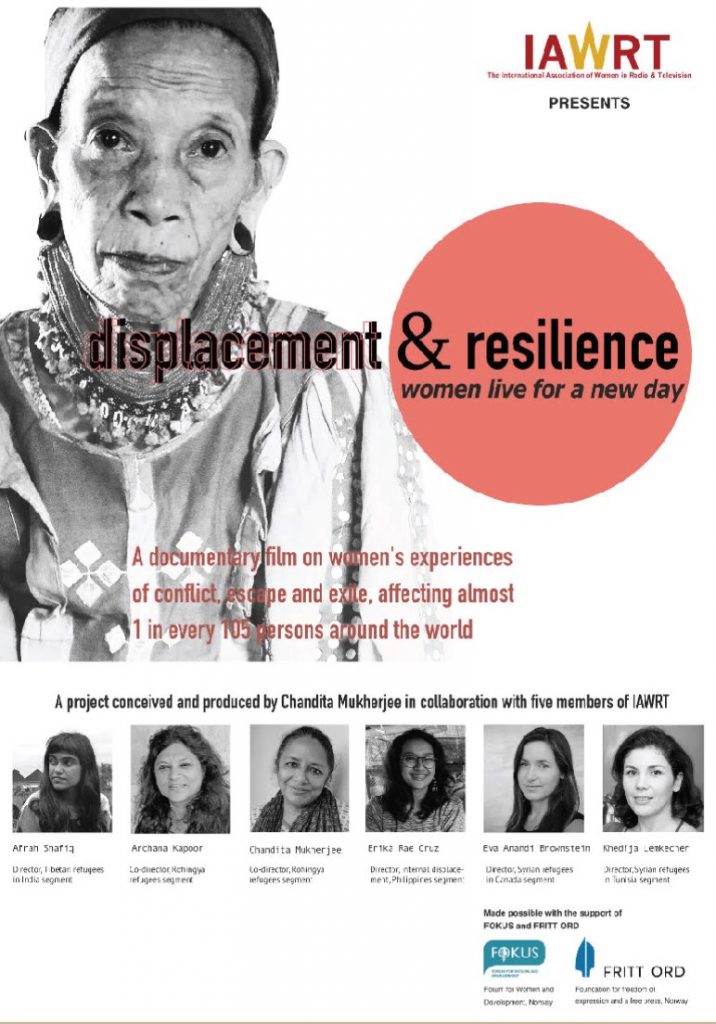
Wednesday May 15, 2019 at 1:00 – 3:00pm
Room ACE 005
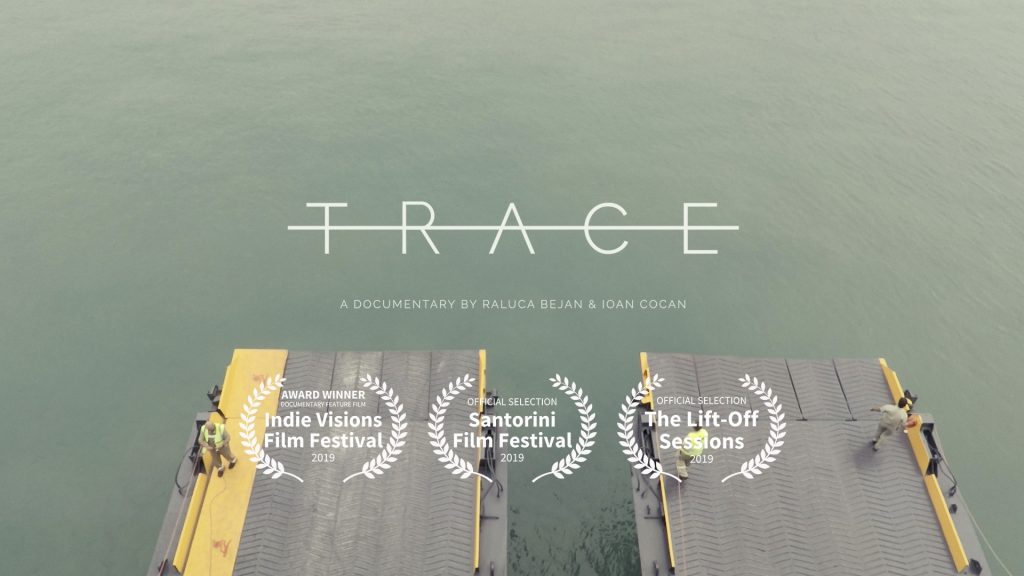
Film Screening and Discussion: Trace
Directors: Ioan Cocan (will be attending) and Raluca Bejan
Public accounts on the 2015 European refugee crisis covered the issue through an individualizing gaze placed on the refugee subject. The refugee in suffering, an experience witnessed by us all, as a spectacle, from the distance: Images of crowded tents, boats caring overflowing numbers of people, children dying on Mediterranean shores. Trace turns the gaze outwards, scrutinizing the “space” of the crisis in which people seek refuge. On the one hand, there is the everyday of the “space.” The ordinary Greek island life with not much to do in the early hours of the day, with people anchoring their fishing boats, some going for a swim, some strolling for a walk. On the other hand, the island space changed from hosting refugees’ presence to hosting their absence. Trace figuratively marks the absence of the refugee crisis by symbolically creating a visual topography of the space containing the crisis, and juxtaposed to narrative accounts of people involved in the crisis.
Wednesday May 15, 2019 at 5:00pm – 7:00pm
Room: ACW 005
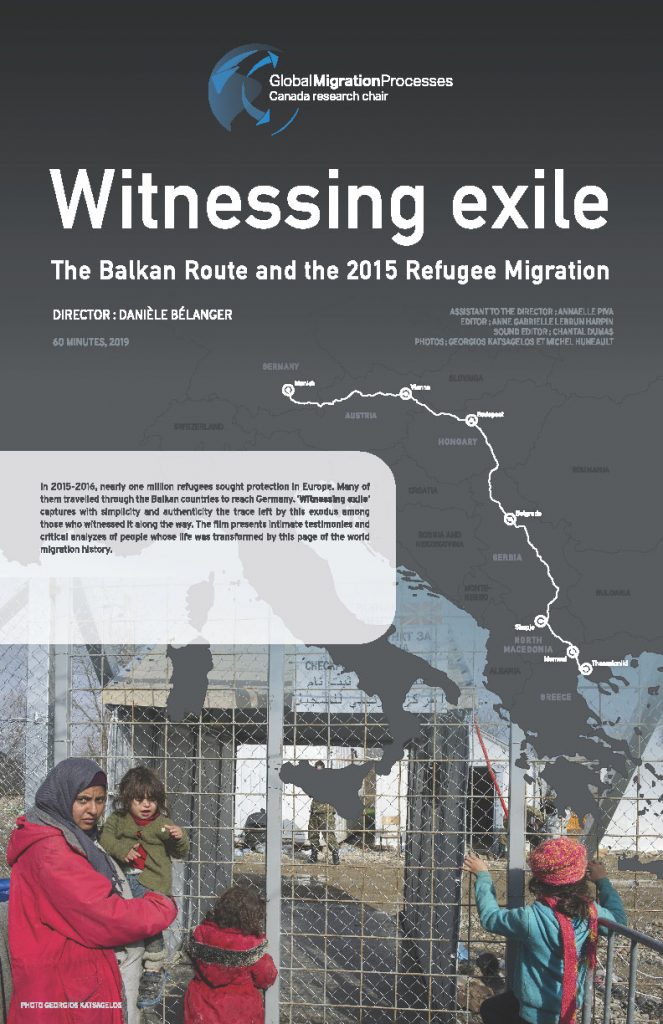
Witnessing Exile: The Balkan Route and the 2015 Refugee Migration
In 2015-2016, nearly one million refugees sought protection in Europe. Many of them travelled through the Balkans to reach Germany. ‘Witnesses of exile’ captures with simplicity and authenticity the trace left by this exodus among those who witnessed it along the way.
The film presents intimate testimonies and critical analyzes of people whose life was transformed by this page of the world migration history.
60 minutes, 2019
Director: Danièle Bélanger (will be attending)
